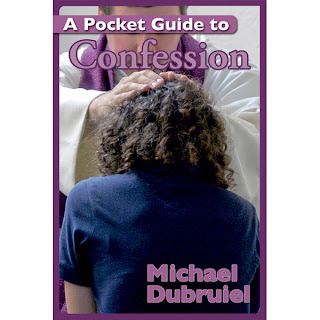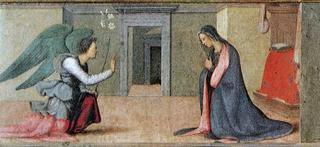Tuesday, November 1, 2005
A Moment Frozen in Time - Michael Dubruiel
We spent part of last week attending the National Catholic Youth Conference in Atlanta. One moment from all that I experienced continues to stay with me, perhaps I might say even to haunt me. While Joseph, Katie and I were walking back toward the exhibit area where Amy and Michael were, we suddenly notice a quiet and people stopping (in an environment that was much like walking through midtown Manhattan on a weekday). Then enmasse young and old dropped to their knees.
Advancing were youth holding signs "Silence and Kneel"…everyone obediently did so as cassocked men holding candles, one swinging incense advanced in front of a coped priest with humeral veil wrapped around the base of a monstrance held the Eucharistic Body of Our Lord aloft.
Those who have seen the movie "The Mission" with one of the best scenes ever filmed about the spiritual life will remember Jeremy Irons playing a priest holding the monstrance in the midst of battle all around him, himself falling and an indigenous man picking up the monstrance and continuing the procession. That is what popped into my mind as I instructed young Joseph to make the sign of the cross as Jesus passed in our midst.
I'll bet that when all is said and done, I'm not alone in this being a moment that will be remembered by all. What is more I have realized that these Catholic prayer moments are the solid foundation that most Catholics never forget--long after they have forgotten most of what they were taught.
There is a lesson here for those of us who try to pass on the faith to our children--introduce them to Christ, like disciples on the road to Emmaus let Christ the stranger teach them, open the Scriptures to them so that they might recognize him in the breaking of the Bread--that they may pick up his Presence and carry it through the streets of life where a battle wages.
Such catechesis is the lesson plan of saints--may all the saints pray that we might take up that charge!
Advancing were youth holding signs "Silence and Kneel"…everyone obediently did so as cassocked men holding candles, one swinging incense advanced in front of a coped priest with humeral veil wrapped around the base of a monstrance held the Eucharistic Body of Our Lord aloft.
Those who have seen the movie "The Mission" with one of the best scenes ever filmed about the spiritual life will remember Jeremy Irons playing a priest holding the monstrance in the midst of battle all around him, himself falling and an indigenous man picking up the monstrance and continuing the procession. That is what popped into my mind as I instructed young Joseph to make the sign of the cross as Jesus passed in our midst.
I'll bet that when all is said and done, I'm not alone in this being a moment that will be remembered by all. What is more I have realized that these Catholic prayer moments are the solid foundation that most Catholics never forget--long after they have forgotten most of what they were taught.
There is a lesson here for those of us who try to pass on the faith to our children--introduce them to Christ, like disciples on the road to Emmaus let Christ the stranger teach them, open the Scriptures to them so that they might recognize him in the breaking of the Bread--that they may pick up his Presence and carry it through the streets of life where a battle wages.
Such catechesis is the lesson plan of saints--may all the saints pray that we might take up that charge!





















